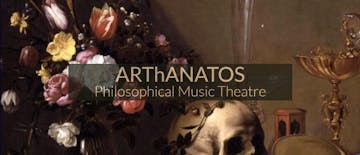ARThANATOS

This is not a call to eccentricity, although we do not shy away from it. This is not an invitation for the unusual, because we are all capable of uniqueness. This is an invitation for the curious, the thoughtful, those who ask questions even though these questions may unsettle or even frighten them.
The musical-philosophical stage creation ARThANATOS is a new form of scenic musical event that directly connects music and philosophy—two fields that are markedly different in their medium, technique, and methodology. This is not merely the linking of music with a philosophical lecture, where music is either an interlude or a background musical decor. Instead, it is a completely new approach that seeks a way to mutually enrich and fulfill the philosophical concept, stage performance, and musical form. In ARThANATOS, music meets philosophy in the exploration of the most obscure and sublime human theme: death. We live in a time often described as apocalyptic and sensitive to the topic of death and life. But how sensitive are we to the phenomenon of death?
Once, death was considered a question for which humanity had no answer, and it was generally understood as a life phenomenon—an anti-phenomenon—beyond human experience and indifferent to individual human destinies. The medieval motif of Danse Macabre depicts the figure of Death, deaf to the pleas of the living, allowing it to attain the status of perfect equality: we are all equal before death. Today, we may have reached the most radical point, as we have become deaf to death itself, and the masses of dead no longer move us. Does this "deafness to death," this ignorance of death, mean that we have "progressed," that we have already overcome death simply by not caring about it, that we can just ignore it? Have we perhaps forgotten another medieval tradition, memento mori, do not forget to die? Perhaps we forget that we die in masses because we have become ignorant of death—those who ignore death? Or have we merely remained ignorant—those who still do not understand death?
Do not come for answers; come for new questions.
Composer • Vasko Atanasovski
Author of the philosophical text • dr. Magdalena Germek
PERFORMERS
Philosopher, narrator • Magdalena Germek
Saxophone, flute • Vasko Atanasovski
Actress • Mirjana Šajinović
Band ARThANATOS
Keyboards • Jan Sever
Flute and acoustic • Alja Petric
Double bass • Žiga Golob
Drums • Ernst Greishofer
Sources used for Arthanatos:
Paul Koudounaris, _Memento mori_, Thames&Hudson
Philippe Ariès, _The Hour of Our Death_, trans. Helen Weaver. New York: Knopf, 1981.
Tem Horwitz, “My death”, v: Malpas, Jeff in Robert C.Solomon (ur.). _Death and Philosophy_. Routledge: London and New York, 1999, str. 5-15.
Sophie Oosterwijk, in Stefanie Knöll (ur.). _Mixed Metaphors: The Danse Macabre in Medieval and Early Modern Europe_. Cambridge: Cambridge Scholars Publishing, 2011.
Ernest Becker, The Denial of Death, Free Press: New York, 1973.